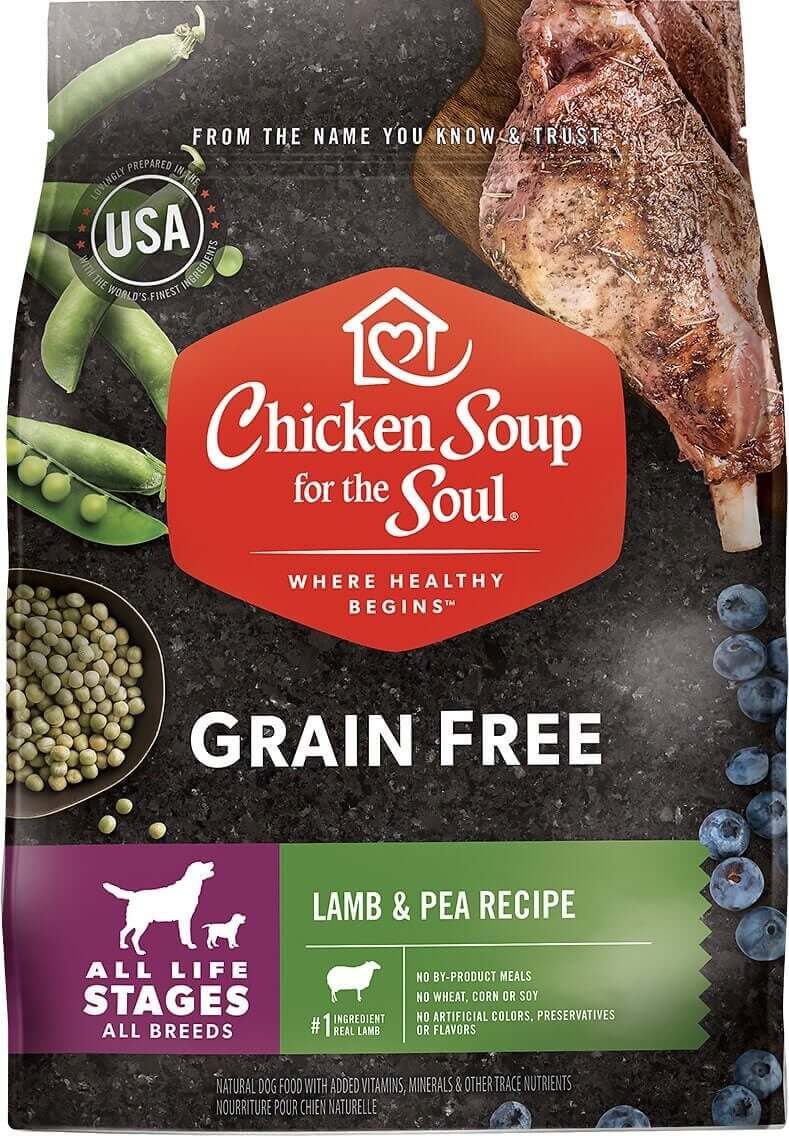
DogFoodAdvisor is reader supported See how
All reviews are 100% impartial but if you buy using links on this page, we may earn a referral fee.
Our Verdict
Chicken Soup for the Soul Grain Free product range is made up of 4 recipes which each receive the Dog Food Advisor’s rating, 4 stars.
Recipe and Label Analysis
Chicken Soup for the Soul Grain Free Chicken, Pea and Sweet Potato was selected to represent the other products in the line for detailed recipe and nutrient analysis.
Chicken Soup for the Soul Grain Free Chicken, Pea and Sweet Potato
Estimated Dry Matter Nutrient Content
Protein
Fat
CarbsCarbohydrates
Chicken, chicken meal, peas, lentils, faba beans, pea flour, chicken fat (preserved with mixed tocopherols), ground flaxseed, sweet potatoes, natural flavor, dicalcium phosphate, salmon oil (preserved with mixed tocopherols), salt, calcium carbonate, choline chloride, dried chicory root, raspberries, tomatoes, blueberries, taurine, mixed tocopherols (preservative), citric acid (preservative), zinc proteinate, zinc oxide, vitamin E supplement, Yucca schidigera extract, ferrous sulfate, manganous oxide, manganese proteinate, copper sulfate, vitamin A supplement, d-calcium pantothenate, sodium selenite, niacin supplement, copper proteinate, riboflavin supplement, calcium iodate, dried Lactobacillus acidophilus fermentation product, dried Lactobacillus casei fermentation product, dried Lactobacillus plantarum fermentation product, dried Enterococcus faecium fermentation product, thiamine mononitrate, pyridoxine hydrochloride, vitamin D3 supplement, cobalt carbonate, folic acid, biotin, vitamin B12 supplement, rosemary extract
Fiber (estimated dry matter content) = 6%
Red denotes any controversial items
| Estimated Nutrient Content | |||
|---|---|---|---|
| Method | Protein | Fat | Carbs |
| Guaranteed Analysis | 27% | 14% | NA |
| Dry Matter Basis | 30% | 16% | 46% |
| Calorie Weighted Basis | 26% | 33% | 41% |
Ingredients Analysis
The first ingredient in this dog food is chicken. Although it is a quality item, raw chicken contains up to 73% water. After cooking, most of that moisture is lost, reducing the meat content to just a fraction of its original weight.
After processing, this item would probably account for a smaller part of the total content of the finished product.
The second ingredient is chicken meal. Chicken meal is considered a meat concentrate and contains nearly 300% more protein than fresh chicken.
It’s important to note that a number of the following ingredients included in this recipe are each a type of legume:
- Peas
- Lentils
- Faba beans
Although they’re a mixture of quality plant ingredients, there’s an important issue to consider here. And that’s the recipe design practice known as ingredient splitting.
If we were to combine all these individual items together and report them as one, that newer combination would likely occupy a significantly higher position on the list.
In addition, legumes contain about 25% protein, a factor that must also be considered when judging the meat content of this dog food.
The sixth ingredient is pea flour, a powder made from roasted yellow peas. This item contains as much as 25% protein, a factor that must be considered when judging the meat content of this dog food.
The seventh ingredient is chicken fat. This item is obtained from rendering chicken, a process similar to making soup in which the fat itself is skimmed from the surface of the liquid.
Chicken fat is high in linoleic acid, an omega-6 fatty acid essential for life. Although it doesn’t sound very appetizing, chicken fat is actually a quality ingredient.
The eighth ingredient is flaxseed, one of the best plant sources of healthy omega-3 fatty acids. Provided they’ve first been ground into a meal, flax seeds are also rich in soluble fiber.
However, flaxseed contains about 19% protein, a factor that must be considered when judging the actual meat content of this dog food.
The ninth ingredient is sweet potato. Sweet potatoes are a gluten-free source of complex carbohydrates in dog food. They are naturally rich in dietary fiber and beta carotene.
From here, the list goes on to include a number of other items.
But to be realistic, ingredients located this far down the list (other than nutritional supplements) are not likely to affect the overall rating of this product.
With five notable exceptions…
First, we find salmon oil. Salmon oil is naturally rich in the prized EPA and DHA type of omega-3 fatty acids. These two high quality fats boast the highest bio-availability to dogs and humans.
Depending on its level of freshness and purity, salmon oil should be considered a commendable addition.
Next, chicory root is rich in inulin, a starch-like compound made up of repeating units of carbohydrates and found in certain roots and tubers.
Not only is inulin a natural source of soluble dietary fiber, it’s also a prebiotic used to promote the growth of healthy bacteria in a dog’s digestive tract.
In addition, we note the use of taurine, an important amino acid associated with the healthy function of heart muscle. Although taurine is not typically considered essential in canines, some dogs have been shown to be deficient in this critical nutrient.
Since taurine deficiency appears to be more common in pets consuming grain-free diets, we view its presence in this recipe as a positive addition.
Next, this food contains chelated minerals, minerals that have been chemically attached to protein. This makes them easier to absorb. Chelated minerals are usually found in better dog foods.
And lastly, this recipe includes sodium selenite, a controversial form of the mineral selenium. Sodium selenite appears to be nutritionally inferior to the more natural source of selenium found in selenium yeast.
Nutrient Analysis
Based on its ingredients alone, Chicken Soup for the Soul Grain Free Dog Food looks like an above-average dry product.
The dashboard displays a dry matter protein reading of 30%, a fat level of 16% and estimated carbohydrates of about 46%.
As a group, the brand features an average protein content of 29% and a mean fat level of 16%. Together, these figures suggest a carbohydrate content of 47% for the overall product line.
And a fat-to-protein ratio of about 53%.
Which means this Chicken Soup for the Soul product line contains…
Above-average protein. Near-average fat. And near-average carbs when compared to a typical dry dog food.
However, when you consider the protein-boosting effect of the pea products, lentils, fava beans and flaxseed, this looks like the profile of a kibble containing a moderate amount of meat.
Chicken Soup for the Soul Dog Food Recall History
The following automated list (if present) includes all dog food recalls related to Chicken Soup for the Soul through April 2025.
You can view a complete list of all dog food recalls since 2009 here.
Our Rating of Chicken Soup for the Soul Dog Food
Chicken Soup for the Soul Grain Free is a dry dog food using a moderate amount of named meat meals as its dominant source of animal protein, thus earning the brand 4 stars.
Compare Chicken Soup for the Soul Dog Food
How does Chicken Soup for the Soul compare with The Dog Food Advisor's most recommended brands?
A Final Word
The Dog Food Advisor does not accept money, gifts, samples or other incentives in exchange for special consideration in preparing our reviews.
However, we do receive a referral fee from online retailers (like Chewy or Amazon) and from sellers of perishable pet food when readers click over to their websites from ours. This helps cover the cost of operation of our free blog. Thanks for your support.
For more information, please visit our Disclaimer and Disclosure page.








